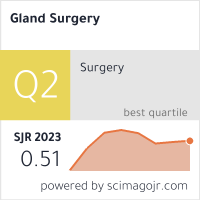IMPACT OF SIMULATED ANESTHESIA CRISIS MANAGEMENT TRAINING ON INTRAOPERATIVE COMPLICATIONS
Abstract
Medical errors that can be prevented often stem from insufficient teamwork and communication among healthcare professionals. Despite their expertise in managing medical emergencies and preventing errors, ineffective collaboration and communication among clinicians can compromise patient care and lead to harm. In the field of anesthesiology, simulation training has transitioned from a research topic to an essential component of residency training and a requirement for completing the ACGME residency program. Research indicates that simulation training enhances the skills of anesthesiologists, particularly in ensuring patient safety, a paramount concern in this field. Therefore, the correlation between simulation training and patient safety appears logical. To further advocate for the integration of simulation training into resident education, larger prospective studies are needed to assess its impact on patient outcomes and the reduction of intraoperative complications. Numerous studies have already demonstrated the benefits of simulation in enhancing anesthesiology education and practice.





